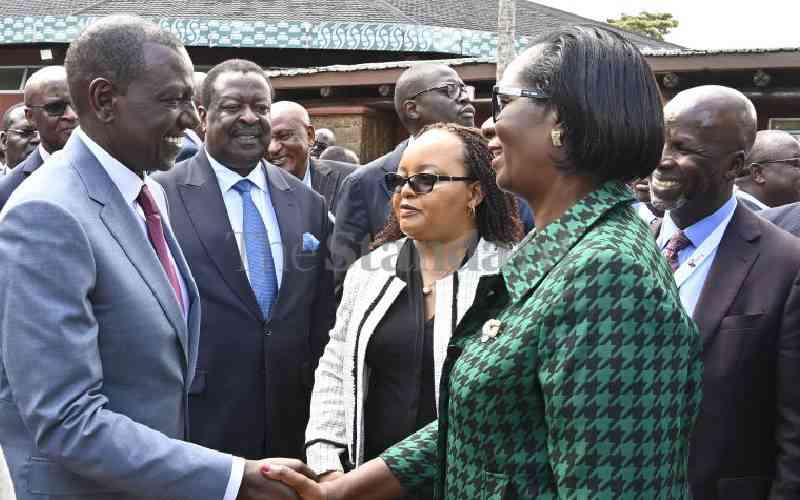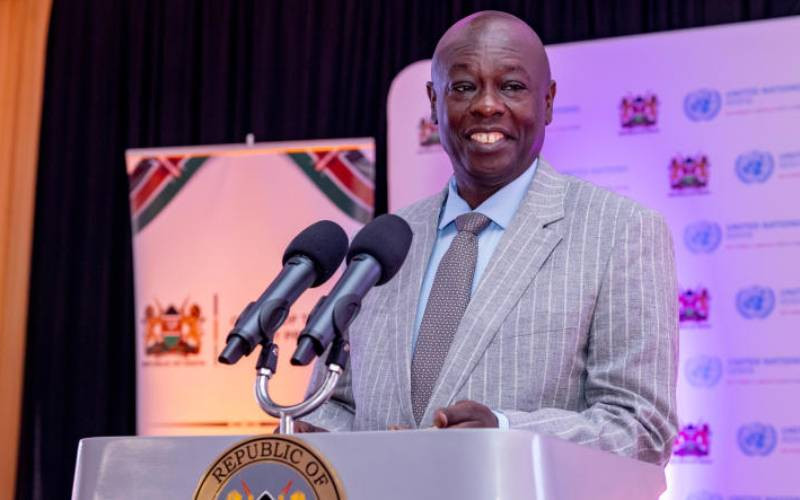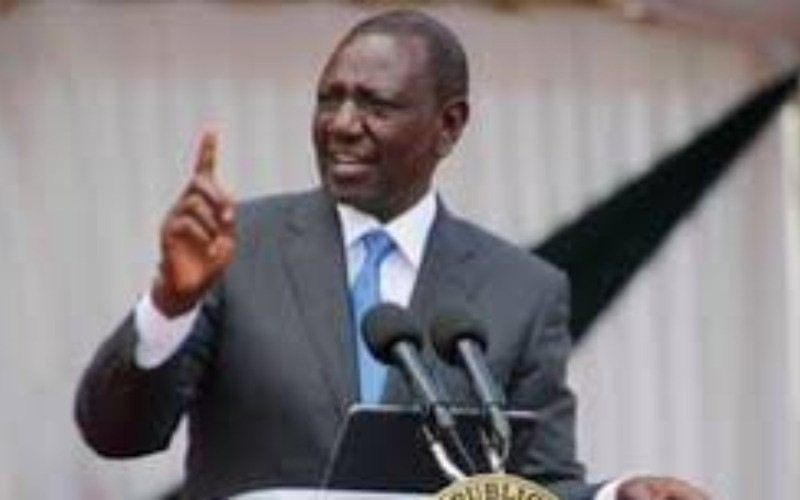 |
|
Lawyer Karim Khan talks with Joshua arap Sang at The Hague Wednesday. [PHOTO: PIUS CHERUIYOT/STANDARD] |
By FELIX OLICK
The Hague: The ICC Wednesday moved to a showdown with the government, issuing an arrest warrant against a Kenyan journalist and accusing a “circle of officials” of devising a “criminal scheme” to compel witnesses to withdraw from The Hague cases.
The government will have to arrest and transfer the journalist, Walter Osapiri Barasa, 41, to the International Criminal Court to face criminal charges, or defy the court. This is the first warrant of arrest issued by the ICC against a Kenyan.
Chief Prosecutor Fatou Besouda successfully petitioned the Pre-Trial Chamber II to order Barasa’s arrest on allegations of “corruptly influencing” three prosecution witnesses to withdraw from the case against Deputy President William Ruto and his co-accused Joshua Sang.
A sensational claim by the prosecution suggesting the culpability by a “circle of officials within the Kenyan Administration” in the crime piles pressure on Kenyan authorities.
“Allegedly, he (Barasa) has been and is still acting in furtherance of a criminal scheme devised by a circle of officials within the Kenyan administration,” said an ICC statement announcing the decision by Judge Cuno Tarfusser, Single Judge of Pre-Trial Chamber II.
“We expect Kenyan authorities to arrest Walter Barasa and hand him over to the Court,” Bensouda said. If found guilty, Barasa faces up to five years in prison, a fine, or both.
On Wednesday, Attorney General Githu Muigai pointed to a long-drawn procedure to enforce the arrest warrant adding the judiciary would determine the matter.
Prof Muigai said the procedure for enforcing any warrant issued by the ICC against any individual in Kenya is subject “to the very clear procedure set out under the International Crimes Act 2010.”
Instructively, the Kenyan Parliament is due to consider a government-sponsored bill to repeal the Act to ultimately end Kenya’s membership of the ICC.
“These procedures require the minister in charge of the interior upon receipt of the formal warrant of arrest to present the said warrant to the judiciary for enforcement,” added the Attorney General.
Judicial consideration
“During the judicial consideration of the legality of the warrant, the subject is entitled to make representations to the court. The final determination on the enforceability of the warrant is, therefore, a judicial one,” Prof Muigai said.
According to the arrest warrant issued Wednesday, Barasa tried to corruptly influenced witness P-0336, P-0256 and P-0536, who is currently testifying before the ICC, by inducing them with large sums of money.
“Walter Osapiri Barasa is criminally responsible under Article 25(3)(a), as direct perpetrator, for the crime of corruptly influencing a witness, (P-0336), by offering to pay him between one million and one and-a-half million Kenyan shillings in order to influence him to withdraw as a prosecution witness,” the arrest warrant reads in part.
Stay informed. Subscribe to our newsletter
The bribery attempt is said to have taken place between May 20 and July 21 at or near Kampala, Uganda, during which, Bensouda said, witness tampering “escalated both in frequency and seriousness”.
The arrest warrant states that witness 536 confirmed to prosecution investigators that she had been contacted by Barasa and that she and her husband were offered Sh1.4 million to withdraw from the ICC process.
Bensouda confirmed to journalists that a third State she declined to name had been asked to arrest Barasa but had failed to do so.
“We had asked a third State to arrest him, but they did not do as requested,” she said.
Judge Tarfusser said he was convinced that “there are reasonable grounds to believe that Barasa is criminally responsible”.
A tough-talking Bensouda said the arrest warrant should be a warning to others who may be involved in obstructing the course of justice through intimidating, harassing and bribing ICC witnesses.
“My Office will continue to do everything it can to ensure that witnesses are able to present their evidence before the Court without fear. Witnesses who have courage to come forward to testify deserve no less,” she said.
“The ability of the Court to determine the truth in the Kenyan cases depends on the willingness of witnesses to come forward and present their evidence in the courtroom. I admire and am grateful for the moral courage displayed by the witnesses involved in these cases,” Bensouda said.
She vowed to do all within her power to protect the integrity of the ICC cases and ensure that justice is allowed to run its course unobstructed.
“He (Barasa) will appear before ICC judges on charges of corruptly influencing and attempting to corruptly influence a person he believed to be a prosecution witness,” Bensouda added.
Responding to questions about the import of the ICC statement implicating a “circle of officials within the Kenyan Administration,” Bensouda clarified during a press conference at The Hague that they are “pursuing individuals and not the Kenyan Government.”
It also emerged that Barasa may initially have been an intermediary for the ICC Prosecution in Kenya for the case against Ruto and Sang.
There are allegations that the journalist only turned against the prosecution after the latter failed to meet his financial demands.
Asked about this, Bensouda would not confirm or deny the claims but maintained that in its investigations, the ICC must use locals to get evidence.
Judge Tarfusser said it was necessary to arrest the journalist to guarantee his appearance in court and to ensure that he does not obstruct the investigation or the proceedings, and to prevent him from continuing with the commission of the crime.
Under Article 70 of the Rome Statute, using bribes or threats to influence witnesses to change or recant their testimony is a crime.
Bensouda maintained that her office had conducted a comprehensive investigation on the basis of documented allegations of witness interference, which she said continues to-date.
According to the Chief Prosecutor, the evidence collected so far indicates that there is a network of people who are trying to sabotage the case against Ruto and Sang by interfering with prosecution witnesses.
Compelling evidence
“Walter Barasa, against whom compelling evidence has been collected, has been part of this network, and his actions fit into this wider scheme that the Office continues to investigate,” she said.
She said that during initial hearing before ICC judges, Barasa will be informed of the crimes which he is alleged to have committed and of his rights under the Rome Statute.
Said Bensouda: “His plea will be entered and the judges will then set a date for a hearing on the charges. At this subsequent hearing, the judges will hear submissions from both the prosecution and Walter Barasa’s defence on whether his case should go to trial. If the charges are confirmed, the judges will set a trial date. These are the next steps in the case against Walter Barasa.”
The prosecution has stated that there have been unprecedented levels of witness interference in the Kenyan ICC cases.
Bensouda was compelled to withdraw the case against former Civil Service Chief Francis Muthaura after a key witness recanted her testimony.
The witness admitted to being bribed to pull out of the case.
 The Standard Group Plc is a
multi-media organization with investments in media platforms spanning newspaper
print operations, television, radio broadcasting, digital and online services. The
Standard Group is recognized as a leading multi-media house in Kenya with a key
influence in matters of national and international interest.
The Standard Group Plc is a
multi-media organization with investments in media platforms spanning newspaper
print operations, television, radio broadcasting, digital and online services. The
Standard Group is recognized as a leading multi-media house in Kenya with a key
influence in matters of national and international interest.
 The Standard Group Plc is a
multi-media organization with investments in media platforms spanning newspaper
print operations, television, radio broadcasting, digital and online services. The
Standard Group is recognized as a leading multi-media house in Kenya with a key
influence in matters of national and international interest.
The Standard Group Plc is a
multi-media organization with investments in media platforms spanning newspaper
print operations, television, radio broadcasting, digital and online services. The
Standard Group is recognized as a leading multi-media house in Kenya with a key
influence in matters of national and international interest.










